Related Research Articles
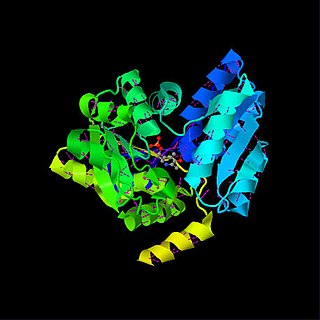
Serine dehydratase or L-serine ammonia lyase (SDH) is in the β-family of pyridoxal phosphate-dependent (PLP) enzymes. SDH is found widely in nature, but its structural and properties vary among species. SDH is found in yeast, bacteria, and the cytoplasm of mammalian hepatocytes. SDH catalyzes is the deamination of L-serine to yield pyruvate, with the release of ammonia.
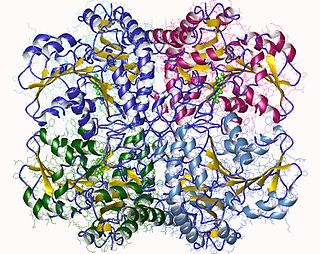
The enzyme cystathionine γ-lyase (EC 4.4.1.1, CTH or CSE; also cystathionase; systematic name L-cystathionine cysteine-lyase (deaminating; 2-oxobutanoate-forming)) breaks down cystathionine into cysteine, 2-oxobutanoate (α-ketobutyrate), and ammonia:
The enzyme carbamoyl-serine ammonia-lyase (EC 4.3.1.13) catalyzes the chemical reaction
The enzyme D-serine ammonia-lyase (EC 4.3.1.18), with systematic name D-serine ammonia-lyase (pyruvate-forming), catalyzes the chemical reaction
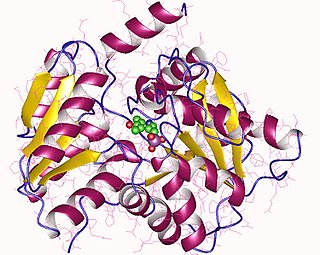
The enzyme L-serine ammonia-lyase (EC 4.3.1.17) catalyzes the chemical reaction

Threonine ammonia-lyase (EC 4.3.1.19, systematic name L-threonine ammonia-lyase (2-oxobutanoate-forming), also commonly referred to as threonine deaminase or threonine dehydratase, is an enzyme responsible for catalyzing the conversion of L-threonine into α-ketobutyrate and ammonia:
The enzyme 5-dehydro-2-deoxyphosphogluconate aldolase catalyzes the chemical reaction
The enzyme 5-dehydro-4-deoxyglucarate dehydratase (EC 4.2.1.41) catalyzes the chemical reaction
The enzyme altronate dehydratase (EC 4.2.1.7) catalyzes the chemical reaction
The enzyme galactarate dehydratase (EC 4.2.1.42) catalyzes the chemical reaction
The enzyme galactonate dehydratase (EC 4.2.1.6) catalyzes the chemical reaction

The enzyme GDP-mannose 4,6-dehydratase (EC 4.2.1.47) catalyzes the chemical reaction
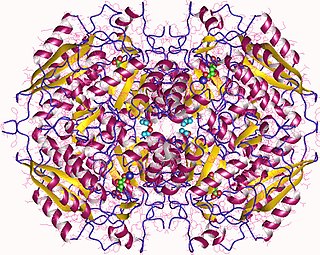
The enzyme glucarate dehydratase (EC 4.2.1.40) catalyzes the chemical reaction
The enzyme gluconate dehydratase (EC 4.2.1.39) catalyzes the chemical reaction
The enzyme L-arabinonate dehydratase (EC 4.2.1.25) catalyzes the chemical reaction
The enzyme mannonate dehydratase (EC 4.2.1.8) catalyzes the chemical reaction

The enzyme phosphogluconate dehydratase (EC 4.2.1.12) catalyzes the chemical reaction
The enzyme xylonate dehydratase (EC 4.2.1.82) catalyzes the chemical reaction:
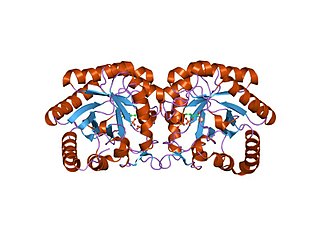
3-Deoxy-D-arabinoheptulosonate 7-phosphate (DAHP) synthase is the first enzyme in a series of metabolic reactions known as the shikimate pathway, which is responsible for the biosynthesis of the amino acids phenylalanine, tyrosine, and tryptophan. Since it is the first enzyme in the shikimate pathway, it controls the amount of carbon entering the pathway. Enzyme inhibition is the primary method of regulating the amount of carbon entering the pathway. Forms of this enzyme differ between organisms, but can be considered DAHP synthase based upon the reaction that is catalyzed by this enzyme.
References
- Imanaga Y (1958). "Metabolism of D-glucosamine. III. Enzymic degradation of D-glucosaminic acid". J. Biochem. Tokyo. 45: 647–650. doi:10.1093/oxfordjournals.jbchem.a126909.
- Merrick JM; Roseman S (1966). "D-Glucosaminic acid dehydrase". Carbohydrate Metabolism. Methods in Enzymology. Vol. 9. pp. 657–660. doi:10.1016/0076-6879(66)09133-X. ISBN 978-0-12-181809-8.
- Iwamoto R, Imanaga Y, Soda K (Jan 1982). "D-Glucosaminate dehydratase from Agrobacterium radiobacter Physicochemical and enzymological properties". J. Biochem. Tokyo. 91 (1): 283–9. doi:10.1093/oxfordjournals.jbchem.a133686. PMID 7068563.
- Iwamoto R, Taniki H, Koishi J, Nakura S (1995). "D-glucosaminate aldolase activity of D-glucosaminate dehydratase from Pseudomonas fluorescens and its requirement for Mn2+ ion". Biosci. Biotechnol. Biochem. 59 (3): 408–11. doi:10.1271/bbb.59.408. PMID 7766176.